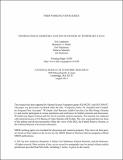Informational Rigidities and the Stickiness of Temporary Sales
Author(s)
Anderson, Eric; Malin, Benjamin A.; Nakamura, Emi; Simester, Duncan; Steinsson, Jon
DownloadSubmitted version (500.0Kb)
Terms of use
Metadata
Show full item recordAbstract
How do retailers react to cost changes? While temporary sales account for 95% of price change in our data, retail prices respond to a wholesale cost increase entirely through the regular price. Sales actually respond temporarily in the opposite direction from regular prices, as though to conceal the price hike. Additional evidence from responses to commodity cost and local unemployment shocks, as well as broader evidence from BLS data, reinforces these findings. Institutional evidence indicates that sales are complex contingent contracts, determined substantially in advance. In a standard price-discrimination model, these institutional practices leave little money ``on the table”.
Date issued
2017-10Department
Massachusetts Institute of Technology. Department of Economics; Sloan School of ManagementJournal
Journal of Monetary Economics
Publisher
Elsevier BV
Citation
Anderson, Eric et al. "Informational Rigidities and the Stickiness of Temporary Sales." Journal of Monetary Economics 90 (October 2017): 64-83 © 2017 Elsevier B.V.
Version: Original manuscript